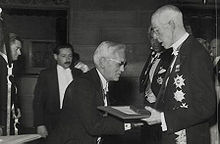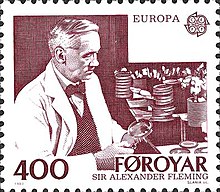Alexander Fleming
Sir Alexander Fleming (born August 6, 1881 in Darvel , East Ayrshire , † March 11, 1955 in London ) was a Scottish medic and bacteriologist . He received the Nobel Prize in 1945 as one of the discoverers of the antibiotic penicillin . He also discovered lysozyme , an enzyme that has strong antibacterial properties and is found in various body secretions such as tears and saliva .
Life

Alexander Fleming was born on the Lochfield Farm, Darvel Parish , in 1881 . He studied medicine from 1902 at St Mary's Hospital Medical School in Paddington . In 1906 he finished his studies, but stayed at the institute. From 1921 he was deputy director and from 1946 director of the institute, which was renamed the Wright Fleming Institute in 1948. From 1928 to 1948 he held the chair of bacteriology at the University of London.
In his younger years, Fleming was involved with car accidents . In 1921 he isolated the enzyme lysozyme, which occurs in the protein of the chicken egg as well as in numerous human body secretions and is able to destroy bacteria .
On September 28, 1928, he accidentally noticed in the laboratory how molds of the genus Penicillium , which had got into one of his staphylococci cultures, had a growth-inhibiting effect on bacteria. Further research later led to the antibiotic penicillin.
Fleming has received many awards for his discovery. On July 4, 1944, he was knighted as a Knight Bachelor , and in 1945 he received the Nobel Prize in Physiology, together with Howard Walter Florey and Ernst Boris Chain , who had continued his research, "for the discovery of penicillin and its healing properties in various infectious diseases" or medicine . He was also honorary doctor of twelve American and European universities, commander of the French Legion of Honor and honorary director of the University of Edinburgh .
Fleming was married to Sarah Marion McElroy (1881-1949) in her first marriage from 1915 until her death. Their only child was Robert Fleming (1924-2015), who became a doctor. After the death of his first wife, Fleming married the Greek doctor Amalia Koutsouri-Vourekas (1912–1986) in 1953 . Alexander Fleming died of a heart attack in London on March 11, 1955 and was buried in London's St Paul's Cathedral .
There are different legends according to which Alexander Fleming is said to have saved the life of Winston Churchill or Fleming's education was financed by Churchill's father. However, these anecdotes cannot be verified by historical sources and have been refuted by various authors and proven to be myths. Fleming himself, for example, described the story according to which his father had saved the life of the young Churchill and whose father in turn financed Fleming's studies in a letter as “A wondrous fable”.
The Fleming Point , a cape on the Antarctic Brabant Island , bears his name. The lunar crater Fleming (together with Williamina Fleming ) was named after him in 1970 and the asteroid (91006) Fleming in 2007 . In 2013 the newly founded “Vocational School for Health and Care” in Stuttgart was named after him. The Alexander Fleming Award from the Infectious Diseases Society of America is named after him.
Freemasonry
Fleming was a Freemason , from 1925 several times Master of the Chair of Santa Maria Freemasons number 2692 and from 1936 the Misericordia Lodge No. 3286 . In 1942 he became the first chief conductor of the United Grand Lodge of England and from 1948 its chief overseer. He was also a member of the London Scottish Rifles Lodge No. 2319 and reached the 30th degree of the Ancient and Accepted Scottish Rite .
literature
- Beverly Birch: Alexander Fleming ( Moments That Changed the World ). Translated from English by Michael Steinbacher. Bitter, Recklinghausen 1993, ISBN 3-7903-0479-4 .
- Alexander Fleming: Penicillin: Its practical application. London 1946.
- Christof Goddemeier: Alexander Fleming (1881–1955): Penicillin. In: Deutsches Ärzteblatt , Vol. 103 (2006), H. 36, p. A2286.
- Heinz Graupner: Alexander Fleming: The discoverer of penicillin. In: Hans Ernst Schneider and Wilhelm Spengler (eds.): Researchers and scientists in Europe today. 2. Physicians, biologists, anthropologists. (= Creators of our time. Volume 4). Ed. By. Stalling, Oldenburg 1955, pp. 151–157 (the editors were former SS cadres).
- Gwyn MacFarlane: Alexander Fleming. The Man and the Myth. Harvard University Press, Cambridge 1984.
- André Maurois : Alexander Fleming. Doctor and researcher. List, Munich 1960.
- Fred Rihner: Sir Alexander Fleming. Commemorative lettering for the 100th birthday. Self-published, Zurich 1981.
- Claude E. Dolman: Fleming, Alexander . In: Charles Coulston Gillispie (Ed.): Dictionary of Scientific Biography . tape 5 : Emil Fischer - Gottlieb Haberlandt . Charles Scribner's Sons, New York 1972, p. 28-31 .
Web links
- Literature by and about Alexander Fleming in the catalog of the German National Library
- Newspaper article about Alexander Fleming in the 20th century press kit of the ZBW - Leibniz Information Center for Economics .
- Information from the Nobel Foundation on the award ceremony in 1945 to Alexander Fleming (English)
Individual evidence
- ↑ Alexander Fleming: On a remarkable bacteriolyte substance found in secretions and tissues. In: Proceedings of the Royal Society of London. Series B. Volume 93, No. 653, (May 1) 1922, pp. 306-317 (digitized: JSTOR ).
- ^ Roy Porter: The Art of Healing , Heidelberg, 2003, p. 459 f.
- ↑ a b Former Fellows of The Royal Society of Edinburgh 1783–2002 at https://www.rse.org.uk/cms/files/fellows/biographical_index/fells_indexp1.pdf , accessed on March 25, 2020
- ^ Robert Fleming: Obituary at jpress.co.uk, accessed August 6, 2016
- ↑ Héloise Dufour and Sean Carroll: Big myths are slowly dying from October 14, 2013 on Spektrum.de
- ^ The International Churchill Society: Sir Alexander Fleming Twice Saved Churchill's Life. The myth of Fleming saving Churchill's life
- ↑ Alexander Fleming's Father and Winston Churchill on snopes.com
- ↑ Kevin Brown: Penicillin Man: Alexander Fleming and the Antibiotic Revolution , Stroud, Sutton, 2004, note 44 to Chapter 2.
- ↑ Alexander Fleming in the Gazetteer of Planetary Nomenclature of the IAU (WGPSN) / USGS
- ↑ Entry of the asteroid (91006) Fleming on the website of the Kleť observatory (English)
- ^ Website of the Alexander Fleming School in Stuttgart, accessed on September 11, 2013
- ↑ Jürgen Holtorf: The lodges of the Freemasons. Nikol, Hamburg o. J. (2000), ISBN 3-930656-58-2 , p. 143.
| personal data | |
|---|---|
| SURNAME | Fleming, Alexander |
| BRIEF DESCRIPTION | Scottish bacteriologist and Nobel Prize winner, one of the discoverers of penicillin |
| DATE OF BIRTH | August 6, 1881 |
| PLACE OF BIRTH | Lochfield , Darvel , East Ayrshire |
| DATE OF DEATH | March 11, 1955 |
| Place of death | London |


